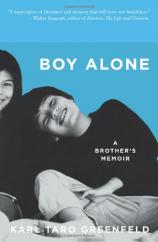Reading Group Guide
Discussion Questions
Boy Alone: A Brother

1. Who is the boy in the title?
2. Describe Karl and Noah as they grew up. How was their relationship different from "normal" siblings? How would you define a "normal" sibling relationship? What did Karl learn from Noah that he might not have learned from a "normal" brother?
3. How are the brothers similar? How was Karl sometimes more difficult to deal with than Noah? Did you like Karl? Does your opinion of him change through the book?
4. What affect did Noah's autism have on the Greenfeld family as a whole? How did it impact them individually? How did autism affect his parent's marriage and their careers?
5. Talk about the Greenfeld home with Noah as its center. What adjectives would you use to describe it?
6. Did the Greenfelds pay enough attention to their normal son? Can the parents of a severely autistic child ever pay "too much attention" to their afflicted child? Can balance be found?
7. Having an autistic brother set Karl apart from his friends, especially when the Greenfelds moved to Southern California. How did having bohemian parents from diverse ethnic backgrounds --- a writer Jewish father and an artist Japanese mother --- compound his feelings of isolation?
8. Noah was considered to be a beautiful child. How might his beauty have shaped the way people saw him? Would he (or the idea of him) have received the same level of attention and compassion if he weren't as attractive?
9. Karl uses excerpts from his father's journals and books throughout the memoir. At one point, his father comments, "Sometimes I hope Noah gets sick and dies painlessly." What do you think of this? Is it cruel and heartless, or a cry of love?
10. The playwright Arthur Miller, a family friend, advised the Greenfelds to institutionalize Noah early. Could you have done this? How might the Greenfeld family's lives have changed if they'd institutionalized him earlier? Karl argues that their overwhelming love for and loyalty to their autistic son may have been their weakness. Do you agree? Yet Karl often argued to keep Noah home when the discussion came up. Why?
11. Discuss the different forms of treatment that Noah underwent. What does it say about our society that we have so few places for people like him? How have our attitudes towards autism changed?
12. Greenfeld mentions the Individuals with Disabilities Act and the Education of the Handicapped Act "which gives parents the legal clout to sue their public school systems to provide one-on-one support so their children can be ‘mainstreamed' --- attend normal classes in a typical school environment for at least portion of the school day." Should children like Noah be "mainstreamed"? What does mainstreaming offer? Does it have drawbacks? One-on-one support is expensive. Do you know what percentage of your local school budget goes toward special needs education?
13. The author writes of people who accused his family of ignoring the "gift of Noah" --- and those who charged that perhaps Noah was reflecting back the Greenfelds' own negative feelings. Why do people feel they have a right to judge others so harshly?
14. Late in the book, Greenfeld writes a scenario for Noah in which he has a job, can communicate, falls in love. Why do you think he included this? How did you feel when you read it --- and what comes after? How does this sequence compare to what is happening in Karl's own life at the time?
15. Karl writes, "unspoken is the motivation for why we do so much of what we do for Noah: it is to make ourselves feel better." Do you think he is being too harsh on himself and his family? How much do we owe to another human being who is our flesh and blood? Reflecting on his parents motives, he writes, "What it came down to for them was this: our home was the best place for Noah, even though Noah was the worst thing that could happen to a home." Is it right to put one member's welfare above the rest of the family?
16. What did you take away from Boy Alone?
Boy Alone: A Brother
- Publication Date: April 27, 2010
- Paperback: 368 pages
- Publisher: Harper Perennial
- ISBN-10: 0061136670
- ISBN-13: 9780061136672







